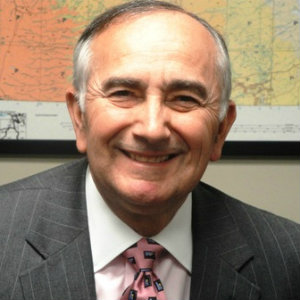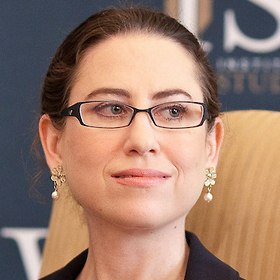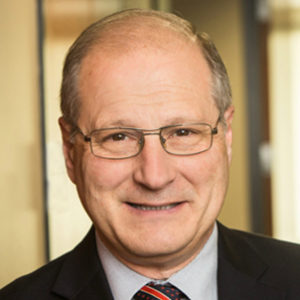Russia: What’s Next?
Examine U.S.-Russia relations since the end of the Cold War, with a view toward exploring where to go from here.
Fall 2020 – Spring 2021
Washington, DC
Once thought to have been on the path to becoming a democratic, capitalist state, Russia remains a preeminent global challenge to the United States. Every American president has entered office committed to resetting relations with Russia only for the relationship to become more acrimonious. Today, relations may be at their lowest point in nearly four decades. Thirty years after the end of the Cold War and two decades into Vladimir Putin’s reign, Washington seems to have finally realized that the Russian challenge is enduring. What is the nature of the Russian challenge to the United States? What are Russia’s objectives, strengths, and weaknesses? In a competition that spans Europe, the Middle East, and even America’s homeland, what do we need to understand about Russia in order to achieve our own objectives? Fellows will learn about the history of U.S.-Russian relations, the nature of the Russian political regime, the role of oil, Russian military and nuclear doctrine and developments, and the current status of relations.
Taught by leading scholars in the field, SSS will consist of 15 evening sessions that meet from September-May and will afford participating fellows an opportunity to gain a breadth of knowledge on critical subjects, forge relationships with senior scholars and practitioners, sharpen analytical frameworks through written and oral arguments, and build a cohort with their peers. Through the lens of strategic competition with Russia, fellows will examine:
What are our goals and how do we achieve them?
What does the strategic competition look like? What are we competing over?
What do we need to understand about our adversary in order to achieve our goals?
Images from the Ministry of Defence of the Russian Federation (Image 1 | 2)
Eric Edelman on great-power competition
ASSIGNED READING:
DISCUSSION QUESTIONS:
ASSIGNED READING:
DISCUSSION QUESTIONS:
In the case of each question above, analyze how Kennan, Kissinger, Fukuyama and Kotkin would answer respectively. Who offers the most persuasive analytic response and why?
ASSIGNED READING:
DISCUSSION QUESTIONS:
ASSIGNED READING:
DISCUSSION QUESTIONS:
ASSIGNED READING:
DISCUSSION QUESTIONS:

In partnership with the Alexander Hamilton Society and the Public Interest Fellowship, we are pleased to sponsor in-depth educational opportunities for public policy professionals in Washington, DC. Ideal candidates are 25- to 35-year old professionals working in national security and foreign policy institutions and organizations, such as government, academia, think-tanks, media, defense and intelligence communities, etc.

The Alexander Hamilton Society is a nonpartisan, not-for-profit, national organization that seeks to identify, educate, and launch young men and women into foreign policy and national security careers imbued with the Hamiltonian perspective of strong and principled American leadership in global affairs.

The Public Interest Fellowship provides exceptional young men and women with professional opportunities and a continuing education in the tradition of freedom. The unique combination of work and study is designed to advance fellows’ pursuit of careers devoted to enriching the political and cultural life of the United States.

Vance Serchuk
Vance Serchuk is Executive Director of the KKR Global Institute and an Adjunct Senior Fellow at the Center for a New American Security. Prior to joining KKR, Mr. Serchuk served for six years as the senior national security advisor to Senator Joseph Lieberman (I-Connecticut).

Nataliya Bugayova
Nataliya Bugayova is a Research Fellow at the Institute for the Study of War (ISW), where she leads the Russia and Ukraine portfolio. Her work focuses on the Kremlin’s foreign policy decision-making and ongoing global campaigns. Prior to ISW, she was the Chief Executive Officer of the Kyiv Post, Ukraine’s independent English-language publication.

James M. Dubik
LTG James M. Dubik (U.S. Army, Ret.) is a Senior Fellow at the Institute for the Study of War and a Professor at Georgetown University’s Security Studies Program. General Dubik has extensive operational experience in Iraq, Afghanistan, Japan, Korea, Thailand, Bosnia, Haiti, Panama, and in many NATO countries.

Frederick W. Kagan
Frederick W. Kagan is a Senior Instructor with the Hertog War Studies Program at the Institute for the Study of War. The author of the 2007 report “Choosing Victory: A Plan for Success in Iraq,” he is one of the intellectual architects of the successful “surge” strategy in Iraq. He is the director of AEI’s Critical Threats Project.

Kimberly Kagan
Kimberly Kagan is a Senior Instructor with the Hertog War Studies Program and founder and president of the Institute for the Study of War. She is a military historian who has taught at the U.S. Military Academy at West Point, Yale, Georgetown, and American University.

Eric S. Edelman
Eric S. Edelman is a Counselor at the Center for Strategic and Budgetary Assessments and the Roger Hertog Distinguished Practitioner-in-Residence at the Philip Merrill Center for Strategic Studies at Johns Hopkins. He has served as U.S. ambassador to the Republics of Finland and Turkey.

Robert Kagan
Robert Kagan is a senior fellow with the Project on International Order and Strategy in the Foreign Policy program at the Brookings Institution. He is a contributing columnist at The Washington Post. His most recent book is The New York Times bestseller, The World America Made.